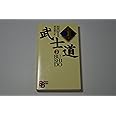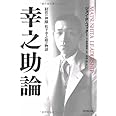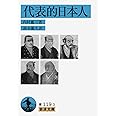プライム無料体験をお試しいただけます
プライム無料体験で、この注文から無料配送特典をご利用いただけます。
| 非会員 | プライム会員 | |
|---|---|---|
| 通常配送 | ¥410 - ¥450* | 無料 |
| お急ぎ便 | ¥510 - ¥550 | |
| お届け日時指定便 | ¥510 - ¥650 |
*Amazon.co.jp発送商品の注文額 ¥3,500以上は非会員も無料
無料体験はいつでもキャンセルできます。30日のプライム無料体験をぜひお試しください。

無料のKindleアプリをダウンロードして、スマートフォン、タブレット、またはコンピューターで今すぐKindle本を読むことができます。Kindleデバイスは必要ありません。
ウェブ版Kindleなら、お使いのブラウザですぐにお読みいただけます。
携帯電話のカメラを使用する - 以下のコードをスキャンし、Kindleアプリをダウンロードしてください。

武士道 (講談社バイリンガル・ブックス) ペーパーバック – 1998/6/10
購入オプションとあわせ買い
「日本の精神文化を知る最良の書」として世界17カ国語に訳され、1世紀にわたって読みつがれてきた不滅の日本人論。
「武士道は、日本を表徴する桜の花と同じように、わが国土の固有の花である」――
国際連盟事務次長として「ジュネーブの星」と歌われた新渡戸博士は、日本人の道徳観を支えている「武士道」を、神道、仏教、儒教の中に探りつつ、キリスト教、騎士道、西洋哲学と対比し、世界の人々に「日本の魂」を説き明かした。
欧米の人々が日本に抱く疑問の数々に答えようとして、その広い識見と深い洞察力をもってまとめあげられた本書は、今なお新鮮な日本人論であると共に、国際人への指針でもある。
- ISBN-104770024029
- ISBN-13978-4770024022
- 出版社講談社インターナショナル
- 発売日1998/6/10
- 言語英語, 日本語
- 本の長さ301ページ
よく一緒に購入されている商品

この商品をチェックした人はこんな商品もチェックしています
商品の説明
著者からのコメント
A little over one hundred years ago, Nitobe Inazo (1862-1933), then a thirty-six-year-old scholar visiting the United States, wrote the following in a letter to William Griffis, author of many books on Japan:
"... I have begun a paper on Bushido -- Precepts of Knighthood -- as an essential of Japanese character, in fact, as a key to understand the moral sentiment of her people."
This is the first reference we have of Nitobe's plan to write this book, which appeared in American bookstores early in 1900. A few years later, riding upon the wave of interest generated by the Russo-Japanese War, an enlarged edition of the book became a best-seller and launched Nitobe into the role of publicist for Japan. While serving as a cultural mediator for over three decades, Nitobe also distinguished himself in other diverse fields as an educator, author, and public servant.
Born into a high-ranking samurai family of the Nambu domain in Morioka prefecture, Nitobe entered the Sapporo Agricultural School in 1877, where he came under the influence of Christianity. He formally joined the Society of Friends (Quakers) while studying at Johns Hopkins University in the United States (1884-87), and remained throughout his life a devout member. Nitobe pursued his advanced studies at several universities in Germany (1887-90), where he received his doctorate in agricultural economics; and, before returning to Japan, he married an American Quaker, Mary Elkinton, which strengthened his personal ties to the U.S.
After a teaching stint at his old alma mater, the Sapporo Agricultural School, Nitobe moved to a position as a colonial administrator in Taiwan (1901-03) under General Kodama Gentaro and Goto Shimpei. Through the latter's connection, he was appointed to a professorial post at Kyoto Imperial University; later, he served as headmaster at the prestigious First Higher School (1906-13); and finally as professor of colonial policy at Tokyo Imperial University (1913-19). Nitobe also had many affiliations with other schools, including Tsuda College, Takushoku University, and Tokyo Women's Christian University, where he served as its first president.
In the latter part of his illustrious career, Nitobe worked as an under-secretary general at the League of Nations (1920-26); served as a member of the House of Peers (1926-33); and was the Japanese Chairman of the Institute of Pacific Relations (IPR; 1929-33), an organization created to improve relations among Pacific-rim nations.
Nitobe's experiences as a young man abroad in the 1880s provided him with the inspiration to write Bushido. He writes in his Introduction that the idea first germinated after a visit with the Belgian scholar, M. de Laveleye. The latter had asked how Japanese taught moral education to young people. Unable to answer as he was, the question had lingered in his mind. His wife Mary, too, had frequently asked him thought-provoking questions about Japan. Thus, after many years, it dawned on him that "it was Bushido that breathed the answers into my nostrils."
Bushido, we see in retrospect, owes its existence to an unexpected crisis in Nitobe's life. While at the Sapporo Agricultural School, Nitobe suffered a severe nervous breakdown that left him unable to work. Taking a leave of absence to regain his health -- Nitobe seems to have been a workaholic -- he was finally afforded the leisure to contemplate his subject without distraction, and to put his Bushido ideas into writing. After spending time first in Kamakura, then in Shonan, Nitobe next took his family to the United States, to Monterey in northern California, where he wrote most of the book.
A family friend, Anna Hartshorne, who was travelling with the Nitobes, played an important role in the production of Bushido. When Inazo was no longer able to write, Anna transcribed at his dictation; later, she helped design the jacket for the first edition. Inazo expresses his thanks to her in his Introduction. Mention must be made, too, of another friend, Uchimura Kanzo (1861-1930), who indirectly influenced Nitobe at this time. A few years before Bushido's appearance, Uchimura -- himself a well-known Christian evangelist and author -- had published two English-language books in a similar genre: How I Became a Christian and Japan and the Japanese. These books rank among the earliest attempts by a Japanese to write for a Western audience. Okakura Tenshin (1862-1913) was another contemporary whose books, The Book of Tea and Ideals of the East, enjoyed similar success in the same period.
While the first edition of Bushido enjoyed modest sales in the United States, Nitobe arranged with a Japanese publisher, Shokabo, to print and distribute the book in Japan. This version sold well and went through nine reprints between 1903 and 1909. A few years later, Nitobe switched publishers and had the book contracted to Teibi Publishing Company in Tokyo. He also arranged for selected extracts from Bushido to be reprinted in the Eigaku Shimpo, a magazine for young people studying English. This venture was initiated by Tsuda Umeko and her staff, who had close ties to Nitobe. Sakurai Oson, the editor, appended notes in Japanese to help the novice overcome difficult passages. Sakurai also made the first translation of Bushido into Japanese in 1908.
Nitobe's Japanese translation of Bushido apparently caught the attention of prominent people, including Inoue Tetsujiro, Professor of Ethics at Tokyo Imperial University, who was perturbed that an amateur such as Nitobe would write on the subject. Uemura Masahisa, too, the well-known Christian leader, criticized the book and its attempt to "Christianize" the moral values of the samurai. Some foreigners who wrote about Japan, most notably the Englishman Basil Hall Chamberlain, in his Things Japanese, expressed distaste for Bushido. Chamberlain refers to Nitobe disparagingly as a "nationalistic professor." But despite the criticism, the book sold well....
出版社からのコメント
[the entire chapter, minus one footnote and the original italics]
Bushido made the sword its emblem of power and prowess. When Mahomet proclaimed that "the sword is the key of Heaven and of Hell," he only echoed a Japanese sentiment. Very early the samurai boy learned to wield it. It was a momentous occasion for him when at the age of five he was apparelled in the paraphernalia of samurai costumes placed upon a go-board[1] and initiated into the rights of the military professions by having thrust into his girdle a real sword instead of the toy dirk with which he had been playing. After this first ceremony of adoptio per arma, he was no more to be seen outside his father's gates without this badge of his status, even though it was usually substituted for everyday wear by a gilded wooden dirk. Not many years pass before he wears constantly the genuine steel, though blunt, and then the sham arms are thrown aside and with enjoyment keener than his newly acquired blades, he marches out to try their edge on wood and stone. When he reaches man's estate, at the age of fifteen, being given independence of action, he can now pride himself upon the possession of arms sharp enough for any work. The very possession of the dangerous instrument imparts to him a feeling and an air of self-respect and responsibility. "He beareth not the sword in vain. What he carries in his belt is a symbol of what he carries in his mind and heart, -- loyalty and honour. The two swords, the longer and the shorter, -- called respectively daito and shoto or katana and wakizashi, -- never leave his side. When at home, they grace the most conspicuous place in the study or parlour; by night they guard his pillow within easy reach of his hand. Constant companions, they are beloved, and proper names of endearment given them. Being venerated, they are well-nigh worshipped. The Father of History has recorded as a curious piece of information that the Scythians sacrificed to an iron scimitar. Many a temple and many a family in Japan hoards a sword as an object of adoration. Even the commonest dirk has due respect paid to it. Any insult to it is tantamount to personal affront. Woe to him who carelessly steps over a weapon lying on the floor!
So precious an object cannot long escape the notice and the skill of artists nor the vanity of its owner, especially in times of peace, when it is worn with no more use than a crosier by a bishop or a sceptre by a King. Sharkskin and finest silk for hilt, silver and gold for guard, lacquer of varied hues for scabbard, robbed the deadliest weapon of half its terror; but these appurtenances are playthings compared with the blade itself
The swordsmith was not a mere artisan but an inspired artist and his workshop a sanctuary. Daily he commenced his craft with prayer and purification, or, as the phrase was, "he committed his soul and spirit into the forging and tempering of the steel." Every swing of the sledge, every plunge into water, every fiction on the grindstone, was a religious act of no slight import. Was it the spirit of the master or of his tutelary god that cast a formidable spell over our sword? Perfect as a work of art, setting at defiance its Toledo and Damascus rivals, there was more than art could impart. Its cold blade, collecting on its surface the moment it is drawn the vapour of the atmosphere; its immaculate texture, flashing light of bluish hue; its matchless edge, upon which histories and possibilities hang; the curve of its back, uniting exquisite grace with utmost strength; -- all these thrill us with mixed feelings of power and beauty, of awe and terror. Harmless were its mission, if it only remained a thing of beauty and joy! But, ever within reach of the hand, it presented no small temptation for abuse. Too often did the blade flash forth from its peaceful sheath. The abuse sometimes went so far as to try the acquired steel on some harmless creature's neck.
The question that concerns us most is, however -- Did Bushido justify the promiscuous use of the weapon? The answer is unequivocally, no! As it laid great stress on its proper use, so did it denounce and abhor its misuse. A dastard or a braggart was he who brandished his weapon on undeserved occasions. A self-possessed man knows the right time to use it, and such times come but rarely. Let us listen to the late Count Katsu, who passed through one of the most turbulent times of our history, when assassinations, suicides, and other sanguinary practices were the order of the day. Endowed as he once was with almost dictatorial powers, chosen repeatedly as an object of assassination, he never tarnished his sword with blood. In relating some of his reminiscences to a friend he says, in a quaint, plebeian way peculiar to him: "I have a great dislike for killing people and so I haven't killed one single man. I have released those whose heads should have been chopped off. A friend said to me one day, 'You don't kill enough. Don't you eat pepper and egg-plants?' Well, some people are no better! But you see that fellow was slain himself My escape may be due to my dislike of killing. I had the hilt of my sword so tightly fastened to the scabbard that it was hard to draw the blade. I made up my mind that though they cut me, I would not cut. Yes, yes! some people are truly like fleas and mosquitoes and they bite -- but what does their biting amount to? It itches a little, that's all; it won't endanger life." These are the words of one whose Bushido training was tried in the fiery furnace of adversity and triumph. The popular apothegm -- "To be beaten is to conquer," meaning true conquest consists in not opposing a riotous foe; and "The best won victory is that obtained without shedding of blood," and others of similar import -- will show that after all the ultimate ideal of knighthood was peace.
It was a great pity that this high ideal was left exclusively to priests and moralists to preach, while the samurai went on practising and extolling martial traits. In this they went so far as to tinge the ideals of womanhood with Amazonian character. Here we may profitably devote a few paragraphs to the subject of the training and position of woman.
内容(「MARC」データベースより)
登録情報
- 出版社 : 講談社インターナショナル (1998/6/10)
- 発売日 : 1998/6/10
- 言語 : 英語, 日本語
- ペーパーバック : 301ページ
- ISBN-10 : 4770024029
- ISBN-13 : 978-4770024022
- Amazon 売れ筋ランキング: - 32,245位本 (本の売れ筋ランキングを見る)
- カスタマーレビュー:
著者について

著者の本をもっと発見したり、よく似た著者を見つけたり、著者のブログを読んだりしましょう
-
トップレビュー
上位レビュー、対象国: 日本
レビューのフィルタリング中に問題が発生しました。後でもう一度試してください。
① 矢内原忠雄訳(岩波新書)初版1938年
② 奈良本辰也訳(三笠書房)初版1993年
③ 岬龍一郎訳(PHP文庫)初版2005年
④ 山本博文訳(ちくま新書)初版2010年
⑤ 英文対訳・須知徳平(講談社)初版1998年
①の矢内原訳は、原著に忠実に和訳したものであり、原著で引用された名句名言も原典に最も近いものです。従って、戦前の文書を読む力のある者にとっては、武士道の和訳として最良のものです。
但し、問題は、原著に忠実であるために②③④の各書にあるような小見出しが無いこと、原著と同じ段落構成(英文仕様)のため邦文としては改行が少ないこと。また、我が国の歴史文化について常識ある当時の人々を念頭に書かれているため、これらの常識を欠く(評者を含めた)現代人にとっては理解し難い点があることです。
②の奈良本訳は、現代口語訳で、小見出しもあり、改行も多く、更に本文中に若干の解説記述を補足しているため、相当読み易くなっています。
しかし、残念ながら、次のような引用文や翻訳の誤りがあります。即ち、第3章「義」では林子平の名言を「勇は義の相手にして裁断の事也。・・・」(34頁)としていますが、正しくは「義は勇の相手にして裁断の心なり。・・・」(学則1)であり、これは、その前段の「勇は義の相手にして勝気の事なり。・・・」と対をなしている言葉ではないでしょうか。また、第5章「仁」のドイツ皇帝の演説(52頁)、第9章「忠義」のアメリカ社会についての説明(89頁)、菅原伝授手習鑑の記述(91頁)など、あちこちに誤訳や不完全訳が散見されます。③など読み易く誤りのより少ない新訳がある現状では、お勧めできません。
③の岬訳は、②よりも更に現代口語に近く翻訳をしたもので、引用される名句名言も現代口語訳が増えています。そのため、第3章「義」の林子平や真木和泉守の名句が現代語訳となり、原文の持つ力強さを味わえないのが残念です。また、やはり一部に不完全訳も見られます(第9章「義」のアメリカ社会についての説明(94頁)や法と国家と人格についての記述(100頁)、第17章の騎士道についての言及188頁や192頁など)。
しかし、総体的に言えば、致命的な誤訳や誤引用は少なく(或いは、誤訳がより重要性の低い部分にあり)、読み易いので、①が難しい人に対しては、お勧めできる一冊です。
④の山本訳は、③岬訳と類似の本です。しかし、残念なのは、引用される名句名言の現代口語訳が更に増えており(例えば、第5章「仁」の上杉鷹山の名言64頁)名句名言の力が減少していること、また、致命的なのは、第4章「勇」で引用する大田道灌の短歌に誤った解釈を付していることです。③より不完全で高価であり、お勧めできません。
⑤須知訳の英日対訳本は、さすがに英文と対で記述しているだけに、和訳は正確です。英文と共に味わいたい人には最適です。
但し、この本は、横書きであること、①と同様に小見出しがないこと、和訳も原著と同じ段落構成(英文仕様)で改行が少ないことなどのため、和訳だけを読むのであれば、余り読み易くはないと思います。
一応星を付けると、矢内原訳☆4つ。奈良本訳☆3つ、岬訳☆4つ、山本訳☆2つ、英文対訳☆4つというところでしょうか(但し、巻末の解説は、山本訳が一番面白いものでした)。
なお、次の名言は、現代口語訳の本でも原文を収録して欲しいものです。文語文と現代口語文では言葉の力の差を感じますね。
林子平「義は勇の相手にして裁断の心なり。道理に任せて決定して猶予せざる心をいふなり。死すべき場にて死し、討つべき場にて討つことなり。」
真木和泉守「士の重んずることは節義なり。節義は例へて言へば人の体に骨あるが如し。骨なければ首も正しく上にあることを得ず。手も物を取ることを得ず。足も立つことを得ず。されば人は才能ありても、学問ありても、節義なければ世に立つことを得ず。節義あれば無骨不調法にても士たるだけのことには事欠かぬなり。」
ちょっと難しいかもしれませんが、楽しみです。
武士道と言うと、単にストイックなものを意味するようだけれども、少し違う。言葉にするのは難しい。
簡単に言えば、武士は
・仏教の影響を受けていたから、死を前にしても最後は静かに開き直れた。
・神道の影響を受けていたから、主君や祖先に対する忠節が基本にあった。
・儒教の影響をうけていたから、礼節・品性(仁・義・礼・信・智)を重んじた。
・そして命の価値が低い時代だったからこそ、少々濫用&エスカレートした。
圧巻だったのは、切腹を描写した別の書籍からの引用。 ※2つあるが、ここでは1つ。
3兄弟が切腹する事になった(家康を殺そうとしたが、その勇気に情けが向けられ一族切腹)
一番下の弟は8歳だった。弟は作法が分からないから、兄2人が手本を見せる。脇差を腹に刺しながら、
「弟これを見よ。会得せしか?あまりに深く掻くな、仰向けに倒れるぞ。うつ伏して膝を崩すな」
※ 仰向けに倒れる事、また膝を崩す事は美学に反するのです。
もう1人の兄も
「目を剋と開けや(中略)力たわむとも、さらに勇気を出して引き回せや」と説明しながら果てる。
兄二人を見届け、8歳の弟も兄二人にならって果てる。
※言葉になりません。事例から感じるものですね。
この本、「武士道はその表微たる桜花と同じく、日本の土地に固有の花である」から始まり
最後は、武士道は100年後には消えるかもしれない。でも雰囲気というか片鱗は日本に残るだろうという締めくくり方をしています。
そう、言語化しにくくても、片鱗は私たちの中にあるのでしょう。
<序文> 米人の妻から質問→なぜ武士道精神や行動習慣が日本中に浸透→妻との対話が執筆動機
・セオドア・ルーズベルト大統領→武士道を読み感動・友人らに配る程だった→日露講和の調停役
→Harvard大学同窓の伊藤博文の秘書官の依頼に快諾→日露戦争終結1ヶ月遅延→日本敗戦だった
<第1章:武士道の淵源>日本でも1908年明治41年に和訳出版→多くの日本人青年達を魅了した
・武士道の思想・日本人の魂に宿る崇高な生き方の伝統的な概念を西洋人に向け解説→原著は英語
・武士道の誇り高い生き方とは→西洋人向けでクリスチャン→西洋の歴史やキリスト教の例え満載
・西洋における学校での宗教教育=道徳教育が日本にナイ→道徳の掟である武士道精神がある
・近代合理主義者を代表する思想家でありながら、福沢諭吉は武士道=日本人の魂と言い切った
〜 志高き武士が重んじた7つの徳:Bushido's Eight Virtues as explicated by Inazo Nitobe 〜
<1: 義または正義の道理-義- Rectitude or Justice> 武士の基本精神・行動指針→品格形成重視
・義=人の正しい道・崇高な正しい道・利潤求めず→❌不正や卑劣な行為=正義に反する行為は恥
<2: 勇気-勇 Courage>勇気=常に穏やかで動揺しない・危機→精神の均衡を乱されない平常心
・義の為に己の命を賭ける→孔子の義を見てせざるは勇なきなり=勇とは正しい事を為す事
・やみくもに危険に飛び込み命落とす=匹夫ひっぷ(道理わきまえない卑しい男)の勇=軽蔑された
<3: 仁 Benevolence of Mercy> 上に立つ者に求められる徳:仁=いたわり・愛情を他に及ぼす事
・権力は強いもの→行使できる権力や地位の誇示(自慢して見せる事)や悪用をいましめていた
・強き者が大切にする仁の精神=他者を思いやる心・辛苦に耐える弱者への哀れみ=高潔な武士
・戦いの中、和歌や俳句学び仁を育成→下の者は仁の得・優しさに心打たれて共に戦い命を預けた
・仁=思いやり・寛容:孟子→魂が持つ性質中最も気高い王者の徳、天下を治める者に不可欠な条件
・伊達政宗「仁(=女性的な慈悲の心)に過ぐれば弱くなる」優しさだけでなく厳しさも必要
<4: 礼儀-礼 Politeness> 相手を尊重し思いやる心=心の価値・人として立派であるかが問われる
・礼=寛容で慈悲深く、自慢せず高ぶらず、相手を尊び不愉快にしない→礼が極まると愛に近づく
・茶道はムダを排した作法=徳の訓練:行動には最善の方法=ムダそぎ落とし優美に→最善=優美
・礼の本質=つまらないものですが=けんそん→相手の価値は世界中の何ものにも勝ると考える
<5: 正直と誠実-誠 Honesty and Sincerity> 誠=言った事を成す:嘘やごまかしを認めない誠実さ
・武士に二言はナイ→言行一致・約束を重視:証文を書く=武士の面子を汚される事→切腹で償う
・約束を守らない・嘘・不誠実な行動→卑怯者と呼び軽蔑→嘘→「卑怯者」は死をもって償った
・明治→生きる為に商売(=かけ引き)を始めた武士→高潔な清廉潔白さがたたり成功しなかった
<信がある者→儲かる・漢字> 商人=仁義礼智信を実行→信用・信となりお店が繁盛する
・仁=思いやり・義=不正しない正直さ・礼=お客様を敬う心がけ・智=安く提供→知恵
<6: 名誉 Honor> 名誉=命より重い価値・最高の善:罪を犯す不名誉→汚名挽回→切腹・死で償う
・恥の自覚が善行を行わせる徳・善き道徳心の土壌→善き行いのスタート地点に立つ事
・誠・高潔に生きる→自然と自己の能力や価値が高まる→誇り・名誉に:侮辱には死で償わせる
・西郷隆盛・武士の中の武士が信奉した敬天愛人の思想=我を愛する心を以って人を愛するなり
→月給数百円の高給=1円=1万円位→3円のあばら屋で15円で質素な生活→残ったお金は困窮者に
<7: 忠義-忠 Loyalty> 武士は何のために生きたか:忠義=心から主君に仕える事・武士固有の教え
・個人→社会の構成要素・家族=1人1人別でない=心同体の存在→個人の利益や権利より家が大切
<武士にとって究極の理想は平和>武士の象徴=刀→真の勝利は暴力を回避・血を流さない勝利
・勝海舟→幕末動乱時に刺客が何度も襲撃→決して刀抜かず:剣の達人・山岡鉄船=無刀流
・武士は怒りを寛容と忍耐で抑えた:徳川家康:堪忍は無事長久の基・己を責めて人を責めない
・孟子:さ細な事で起こるようでは君子ではない・大義の為に憤ってこそ正当な怒りである
・武士とは安易な死より厳しく困難な生を選ぶもの:天命を果たす為に生じた死=不名誉でナイ
・日本人の桜好き・花見=武士の姿をイメージ:役目を終えた後=散る=命を捨てるいさぎよさ
<第15章: 武士道の感化>
・Nobless Obligeノブレスオブリージュ=上に立つ者に伴う公の精神・果たす義務=他の身分の手本に
<第16章: 武士道はなお生きているか?>
・現代は宗教教育も武士道教育もナイ→この本がすっと入る→実はまだ武士道精神が残っている
・武士の生き方・実践・行動哲学=他の身分の手本→尊敬→時代が変わっても生き続けている















